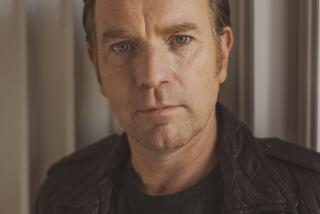Classic Hollywood: ‘How to Succeed in Business Without Really Trying’
- Share via
Rarely does one describe a 79-year-old man as “boyish” (and actually mean it), but the phrase fits Robert Morse like a comfortable pair of shoes. His hair may be gray, but the impish personality, young countenance and modified Beatles haircut still remain from when he catapulted to Broadway stardom and his first Tony Award nearly 50 years ago in the Frank Loesser-Abe Burrows musical “How to Succeed in Business Without Really Trying.”
Morse went on to star in such films as “The Loved One” (1965) and “A Guide for the Married Man” and the film version of “How to Succeed,” both from 1967.
“He is boyish,” agrees “Mad Men” executive producer and creator Matthew Weiner, who cast Morse in the Emmy Award-winning series as the Ayn Rand-loving, bow-tie-wearing and often shoeless advertising giant Bertram Cooper, founding partner in the Madison Avenue ad agency Sterling Cooper. In the season beginning July 25, he is a founding partner in the new agency Sterling Cooper Draper and Pryce.
“He is just naturally playful, a youthful eccentric,” Weiner says. “He is an original.”
When Morse learns his visitor has followed his career since she was a kid in the 1960s, he breaks into a wide grin.
“Did you have a crush on me?” he asks.
“Sorry. No.”
“Darn it,” he replies.
Morse, who also won a Tony 20 years ago for his uncanny depiction of Truman Capote in “Tru,” is grateful at this point in his long career to get a show like “Mad Men.”
“I had no idea of what I was getting into,” says Morse, relaxing in an office at the studios in downtown Los Angeles where “Mad Men” films. When he read for Weiner, the actor says, “he said to me, ‘I’m so grateful that you came in. I wanted somebody of your age and that background.’ I read and went home and they called me and said I got the part. I was elated.”
Morse was also elated he didn’t have to grow Cooper’s goatee and mustache. “They attach it,” he says with his impish grin. “You know those things cost a lot of money. Thank God I didn’t have to grow them because I am very uncomfortable with a beard and a goatee. I would be afraid my children wouldn’t recognize me.”
Morse, though, still can’t get over the respect paid to him on the set. Maybe too much respect. “I can’t tell you how many times I have to tell people not to call me ‘sir’ on the set of ‘Mad Men,’ ” he says, laughing. “I say ‘sir’ was my father’s name.”
Wednesday evening, Weiner will host a screening of “How to Succeed,” which opens the Los Angeles Conservancy’s Last Remaining Seats movie series that spotlights the glorious old movie palaces on Broadway. Morse and the film’s costar, Michele Lee, who took over the romantic lead of Rosemary on Broadway, are scheduled to reunite for the sold-out event at the Los Angeles Theatre.
The film version, adapted and directed by David Swift, was not a huge financial hit despite good reviews and an iconic performance by Morse as J. Pierrepont Finch, an ambitious young man who works his way up in record time from window washer to mailroom clerk to executive at the World Wide Wicket Co. Also in the cast is Rudy Vallee, reprising his Broadway role as the company president, J.B. Biggley.
Of course, Morse has gone full circle from being the young executive in ‘How to Succeed” to the veteran executive in “Mad Men,” which like the musical is set in early 1960s New York, though the stage show is much lighter than the TV series.
The connection was not lost on Weiner, though he admits he hadn’t seen the film in a long time when he cast Morse. In fact, it was a former co-executive producer on the series who brought up Morse’s name. “We were looking for someone kind of eccentric,” Weiner says. “I cast actors all the time, and you see how he has the presence and showmanship. He has really warmed to the sort of darker side of the characters.”
It was Loesser’s “Where’s Charley?,” in which Ray Bolger sang the standard “Once in Love With Amy,” that inspired Morse to become an actor.
He remembers seeing “Where’s Charley?” for the first time like it was yesterday, not more than 60 years ago. “Watching Ray Bolger singing all the Frank Loesser songs…. I knew I wanted to be an actor,” Morse says.
“I was just shaken completely. I saw it 17 times. I finally met Roy Bolger backstage. He was very kind to me. I remember to this day him saying if I ever get to do a show to be kind to people who are standing outside the stage door. ‘If you can give them a little hand or a talk’ — I always tried to share that kindness that I got originally from Ray Bolger.”
For more information on the screening go to https://www.laconservancy.org/remaining/index.php4.
More to Read
The complete guide to home viewing
Get Screen Gab for everything about the TV shows and streaming movies everyone’s talking about.
You may occasionally receive promotional content from the Los Angeles Times.







